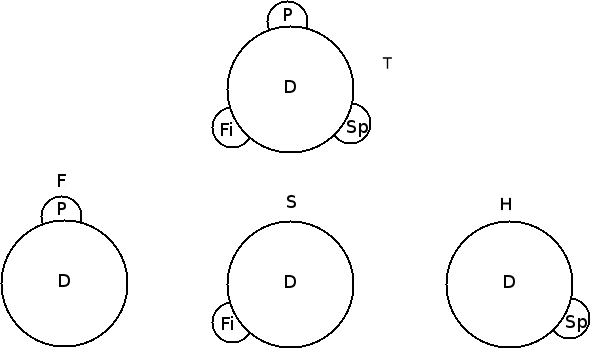new co-authored paper: “Dormant Dispositions, Agent Value, and the Trinity”
God can’t be “perfect in love” unless he is multipersonal?
God can’t be “perfect in love” unless he is multipersonal?
Did fourth century Christians come to a consensus about “the doctrine of the Trinity”?
Could each divine “Person” of the Trinity be either an attribute of God or God together with an attribute?
Our friend Dr. Ed Feser has got himself worked up into full drunken polemicist mode. I earn ridicule and ire normally reserved for Dawkins types. Evidently I touched a nerve by pointing out that most (analytic) philosophers now – reflecting a fairly wide consensus since early modern times – think of God as the greatest being there is or could be, and not as “Being… Read More »why I’m not a Thomist 1 – the Christian tradition that God is a Being
An appealing theological option which is neither Nicene nor “Arian”?

Here’s a second application for my Latin Trinity chart (see the first post for what the letters designate). Let’s say that a state of affairs is a thing/substance having a property at a time or timelessly.
The “persons” here are just modes of D, that is, states of affairs involving D. So the Son just is D having Fi. And the Father just is D having P. And the Holy Spirit just is D having Sp. Regarding each of F, S, and H, each of them “just is” D – in the sense that in each of them, there is one and the same D.Read More »The Latin Trinity Chart 2 – a version of FSH modalism
Our friend Fr. Aiden has responded to my post defending analytic theology (and analytic theologians). This bit, I think, advances the discussion: …my concern is not false teaching per se but the subjection of God’s self-revelation as Father, Son, and Spirit to the quest for philosophical precision. And this brings me to the heart of my concern. As far as I can tell, the theological… Read More »more on despising analytic theologians
In what sense, according to Craig and Moreland, are the Father, Son, and Holy Spirit each “divine”? Well, consider Rover. They’d say that the following four things are canine: Rover Rover’s nose Rover’s tail Rover’s left ear So, just as the parts of a dog are just as canine as the dog, so maybe “we could think of the persons of the Trinity as divine… Read More »Trinity Monotheism part 5: “divine”
In 2007 I read Triads and Trinity, by the late Classicist and Egyptologist John Gwyn Griffiths, a book which tries to trace outside influences on the development of the Christian doctrine of the Trinity. I was skeptical about any such project, as I knew it has long been a staple of crackpot antitrinitarians to allege that the Trinity doctrine was illegally imported from (take your pick) Babylon,… Read More »Triads and Trinity: a mini-review

Thanks to all you excellent commenters! I can’t always keep up.
I see my friend philosophy professor Harriet Baber has been on there asking some provocative questions like some kind of Socratic gadfly. 🙂 I thought they deserved a post. The quotes here are from her comments.
WHAT pre-existed: the 2nd Person of the Trinity or Christ?
Orthodox / catholic-kosher answer: both. The 2nd person of the Trinity is assumed to be personally identical to (and so, identical to) the man Jesus.
What if I hold that the Trinitarian Person was pre-existent but became a human at some time in the late 1st century BC so that, in effect, Christ is a proper temporal part of the 2nd Person of the Trinity. Does this make me an adoptionist?
To all the non-philosophers out there; she is applying the recent metphysical doctrine of temporal parts here, thinking of, e.g. a self as extended across or spread out over time, rather than lasting (entire) though time. In current day metaphysicians’ lingo, people perdure rather than endure. So in this case the one Christ would be that whole four-dimensional, event-like thing, with the early part being the pre-human logos and the latter part being the human Jesus – but as I’m using the terms here (this is tricky – there are no standard terms here) the logos and Jesus would be temporal parts of the one Christ.
I don’t know, Harriet, whether or not this makes you an adoptionist; I suggest we lay aside Read More »Metatheology with Baber
Dr. Brown is caught between the traditional claim that God is the Trinity and the clear NT claim that God is the Father.
James Goetz and Corby Amos on the inconsistent triad about Jesus dying.
Here’s a gem of a passage from a little-read paper by Richard Swinburne, from this book. This is part of talk he gave at a 2001 conference in Moscow, Russia, co-sponsored by the Society of Christian Philosophers and the Russian Orthodox church. So he’s explaining the wider context of analytic philosophy to them. Sometimes, when we have to explain things to those outside the camp,… Read More »Swinburne on analytic vs. continental philosophy
Can “the doctrine of the Trinity” or “the deity of Christ,” as Dr. Craig understands them, be expressed in New Testament Greek?
 Prolific blogger (at Triablogue) Steve Hays and I have recently been discussing various things.
Prolific blogger (at Triablogue) Steve Hays and I have recently been discussing various things.
At the end of a recent exchange, I basically said: Dude, I don’t know what you think “the” doctrine of the Trinity is. What, in your view, does it mean to say that God is a Trinity?
He’s now responded here.
In this post, I try to understand just what he’s claiming, in other words, what he takes trinitarianism (rightly understood) to be.
This is a bit risky, because I think he’s confused about the concept of identity, and I’m trying to hear a self-consistent view here.
The first job in critical thinking is carefully listening to what the source at hand is saying. Here I listen carefully, editing out a lot of his methodological musings and terminological quibbles, trying to get to the meat of his view.
I think the meat starts here:Read More »What is the Trinity? A Dialogue with Steve Hays – Part 1
 Three World Vision employees are fired because according to World Vision they don’t believe in that Jesus is “fully God” or that he’s a member of the Trinity.
Three World Vision employees are fired because according to World Vision they don’t believe in that Jesus is “fully God” or that he’s a member of the Trinity.
But inquiring minds want to know: what did they believe, what statement or statements of faith did they sign, and are the beliefs therein necessary and sufficient for being a real Christian? This time, we’re digging a little deeper.
Their website saith,
World Vision U.S. hires only those who agree and accept to its Statement of Faith and/or the Apostles’ Creed. (source)
Interesting! Note the “and/or” – employees must affirm either one or both. As we’ve noted before here at trinities, nothing in the so-called Apostles’ Creed requires belief in either the “full deity” of Christ (whatever that may mean) or any sort of trinitarian theory.Read More »No Trinity, No Job – Part 2
In this episode we hear a voice from 1852 describing a lost species of American Christianity:
A question from the Facebook group a few weeks ago: …One model of the Trinity that I’ve heard articulated–call it “paterderivationism”–says that the way in which the Father, the Son, and the Spirit are homoousios is the same way in which Caesar, Pompey, and Crassus may be called “homoousios”: they share the same kind of nature, though… not the same instance of that nature. According to… Read More »“paterderivationism,” monotheism, and “mono-theos-ism”
Let’s define “Jesus is God” to mean one or more of these: Jesus is numerically identical to the one God, YHWH, or Jesus fully possesses the divine nature of the one God, or Jesus is one “divine person” within the one God. The New Testament gospels are centrally concerned with Jesus, and with the one God. But how do they relate the two – or… Read More »Do the Gospels disagree about Jesus and God? Part 1 – Three Options
Dr. James White’s stated reasons for not debating me are based on misunderstanding.